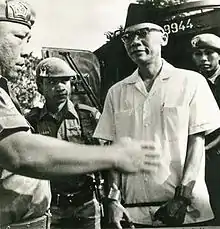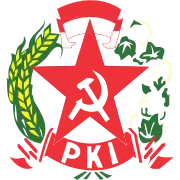Sudisman
Sudisman (1920 – October 1968[3]) was a general secretary of the Communist Party of Indonesia (PKI) and the only PKI leader to be put on trial following the 30 September Movement in 1965. He was sentenced to death and executed.[4][5][1]
Sudisman | |
|---|---|
 | |
| Born | 1920 |
| Died | October 1968 |
| Nationality | Indonesian |
| Occupation | General secretary of the Communist Party of Indonesia[1] |
Sudisman[2]
He was the fourth highest-ranking member of the Communist Party of Indonesia's Politburo, and was the only one of the five senior leaders of PKI to be tried.[5][3][1] All but one of the ten PKI politburo members were killed.[3]
Sudisman tried to reorganize the PKI into an underground movement after other senior leaders were captured and summarily executed. He acted as the leader of the PKI for a short time before his arrest. He was finally arrested in December 1966.[3]
Trial
Sudisman was the highest ranking PKI politburo member to appear before the Mahmillub (Mahkamah Militer Luar Biasa, the Extraordinary Military Tribunal),[6] as the other members had been killed. Sudisman's trial was held in July 1967.[3]
Testimonies of Sudisman and other PKI leaders greatly strengthened the case against them in the trial. They more or less admitted their own involvement in a coup attempt. However, they claimed that the 30 September Movement was justified as there had really been a so-called "Council of Generals" that had plotted against Sukarno to take power after his death, or to depose him. They denied accusations and interpretations that the PKI had been the sole organizer of the coup attempt.[6] Army's and prosecution's version of the events are highly unlikely, and the first initiative for the coup attempt may have come from dissatisfied army officers, despite the PKI leadership's involvement.[6]
Sudisman's testimonies gave a plausible explanation that PKI as an organization had not been involved with the coup attempt, and Dipa Nusantara Aidit had been the person who had acted on his own initiative and plotted with the officers.[1][6] Suharto managed to use Aidit's actions as an justification for the Indonesian killings of 1965–66. The resulting elimination of the PKI from Indonesian politics achieved goals of right-wing officers and Muslim extremists who were backed by the United States.[1]
Sudisman was executed in October 1968.[3]
See also
References
- Robert Manne; Mark Aarons (1 March 2016). "Rivers ran red". The Monthly.
- Benedict R. O'G Anderson (January 2006). Language and Power: Exploring Political Cultures in Indonesia. Equinox Publishing. p. 269. ISBN 978-979-3780-40-5.
- Guy J. Pauker (February 1969). "The Rise and Fall of the Communist Party of Indonesia" (PDF). RAND Corporation. Memorandum RM-5753-PR.
- "MIA: Encyclopedia of Marxism: Glossary of People: Su". Marxists Internet Archive. Retrieved 9 May 2016.
- Helen-Louise Hunter (2007). Sukarno and the Indonesian Coup: The Untold Story. Greenwood Publishing Group. p. 49. ISBN 978-0-275-97438-1.
- Harold Crouch. "Another Look at the Indonesian 'Coup'" (PDF). sukarnoyears.com. Archived from the original (PDF) on 2 November 2013.
External links
- Defence speech given by Sudisman on 21 July 1967 at the Marxists Internet Archive (in Indonesian)
- Speech given by Sudisman in September 1966 at the Marxists Internet Archive (in Indonesian)

